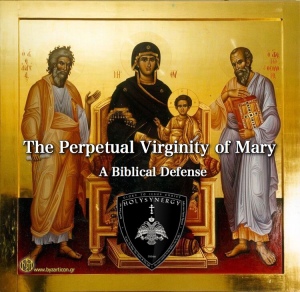
(1). The “brothers and sisters” of the Lord in scripture are not Jesus’ biological siblings, but cousins and close relatives considering that the word cousin was not used in the ancient Aramaic spoken by the Jews in the ancient world.
(2). Being that Jesus Christ is the First – Born of the Theotokos (Matt 1:25), it would obviously mean that He is the oldest of all His “siblings”. Had this been the case, it would be against the ancient Palestinian tradition for the younger to correct and rebuke one’s elders, as we see His “brothers” do in John 7:3-5.
(3). In John 19:26, Jesus gives His Mother to the Apostle John. Had Jesus had siblings, He would have passed that care to the next oldest sibling. This was the ancient law of the Jews.
(4). Protestants and other heterodox sects use Matt 13:55 as one of the scripture verses to argue against Mary’s virginity considering that there is a list of “brothers” of Jesus by name; that being James, Joseph, Simon, and Jude. This was an argument used by the ancient Helvidius and Antidicomarianite heretics.
Yet, it must be taken into account that James, the “brother of the Lord” in Acts 9:27 is the Son of Alphesus, whereas the Martyred James of Acts 15:6 was the son of Zebedee. (See Matt 10:3, Mark 3:18). Jude, being the brother of James the Less (Luke 6:16, Acts 1:13) would have to also be the son of Alphesus.
St. Simon (not to be confused with Simon Peter), was known by the early church to be Simon, Son of Cleopas, in whom succeeded James the Apostle as Bishop of Jerusalem. On comparing John 19:25 with Matthew 27:56, and Mark 15:40 (cf. Mark 15:47; 16:1), we find that Mary of Cleophas, or more correctly Clopas (Klopas), the sister of Mary the Mother of Christ, is the same as Mary the mother of James the Less and of Joseph (Joses). That being said, St. Simon of Jerusalem was also the son of Mary of Cleopas, along with Joseph. (Not to be confused with the adoptive earthly father of Jesus).
Note: Cleopas and Alphaeus are the same person. Papias of Hierapolis, who lived c. 70–163 AD, teaches: “Mary the wife of Cleophas or Alphaeus, who was the mother of James the bishop and apostle, and of Simon and Thaddeus, and of one Joseph.”
(5). “Until” in Matt 1:24-25 is a idiomatic expression not to be taken literal, as 1 Sam 6:23 also expresses that Saul’s daughter didn’t have children until her death. Does that mean that she had children after her death? Of course not! In 1 Cor 15:25, it states that Jesus must reign until He has put all enemies under His feet. Would that mean that His reign would eventually end? Absolutely not. (Luke 1:33).
Hilary of Poitiers: “If they [the brethren of the Lord] had been Mary’s sons and not those taken from Joseph’s former marriage, she would never have been given over in the moment of the passion [crucifixion] to the apostle John as his mother, the Lord saying to each, ‘Woman, behold your son,’ and to John, ‘Behold your mother’ [John 19:26–27), as he bequeathed filial love to a disciple as a consolation to the one desolate” (Commentary on Matthew 1:4 [A.D. 354]).
Athanasius: “Let those, therefore, who deny that the Son is by nature from the Father and proper to his essence deny also that he took true human flesh from the ever-virgin Mary” (Discourses Against the Arians 2:70 [A.D. 360]).
Augustine: “In being born of a Virgin who chose to remain a Virgin even before she knew who was to be born of her, Christ wanted to approve virginity rather than to impose it. And he wanted virginity to be of free choice even in that woman in whom he took upon himself the form of a slave” (Holy Virginity 4:4 [A.D. 401]).
Cyril of Alexandria: “[T]he Word himself, coming into the Blessed Virgin herself, assumed for himself his own temple from the substance of the Virgin and came forth from her a man in all that could be externally discerned, while interiorly he was true God. Therefore he kept his Mother a virgin even after her childbearing” (Against Those Who Do Not Wish to Confess That the Holy Virgin is the Mother of God 4 [A.D. 430]).
Pope Leo I: “His [Christ’s] origin is different, but his [human] nature is the same. Human usage and custom were lacking, but by divine power a Virgin conceived, a Virgin bore, and Virgin she remained” (Sermons 22:2 [A.D. 450]).
Therefore, being that Mary was the spouse of the Holy Spirit, it is clear by scripture and by the teachings of the Early Christians that Mary remained a Virgin all the days of her life.
